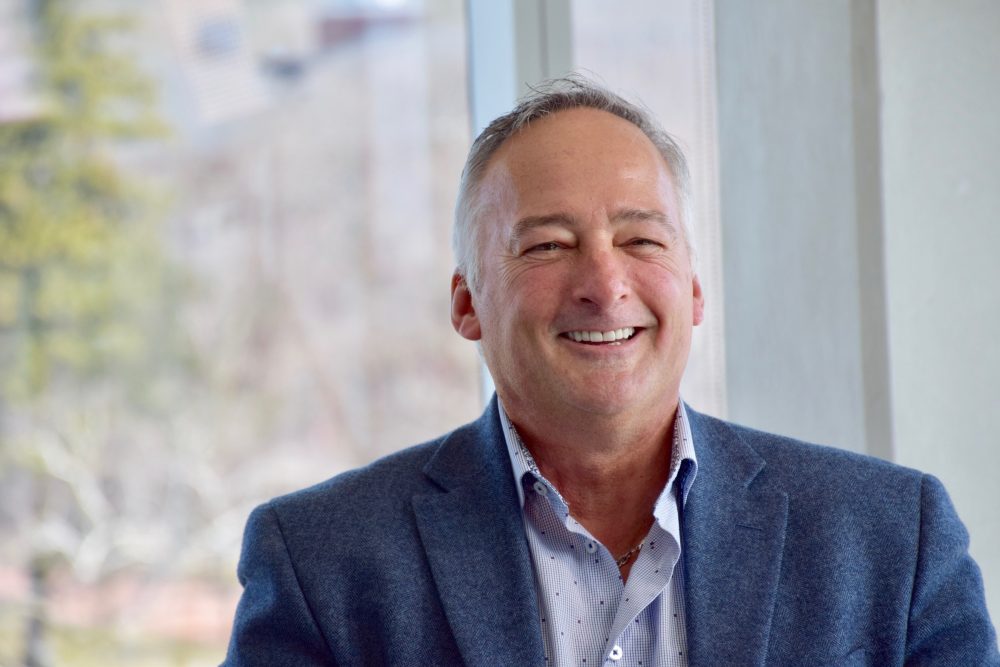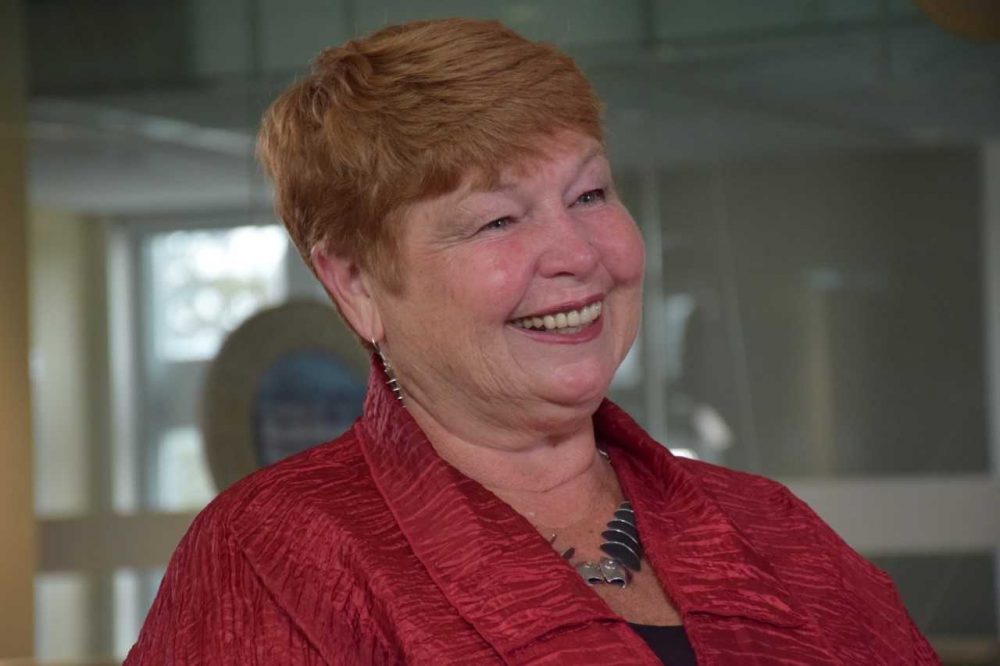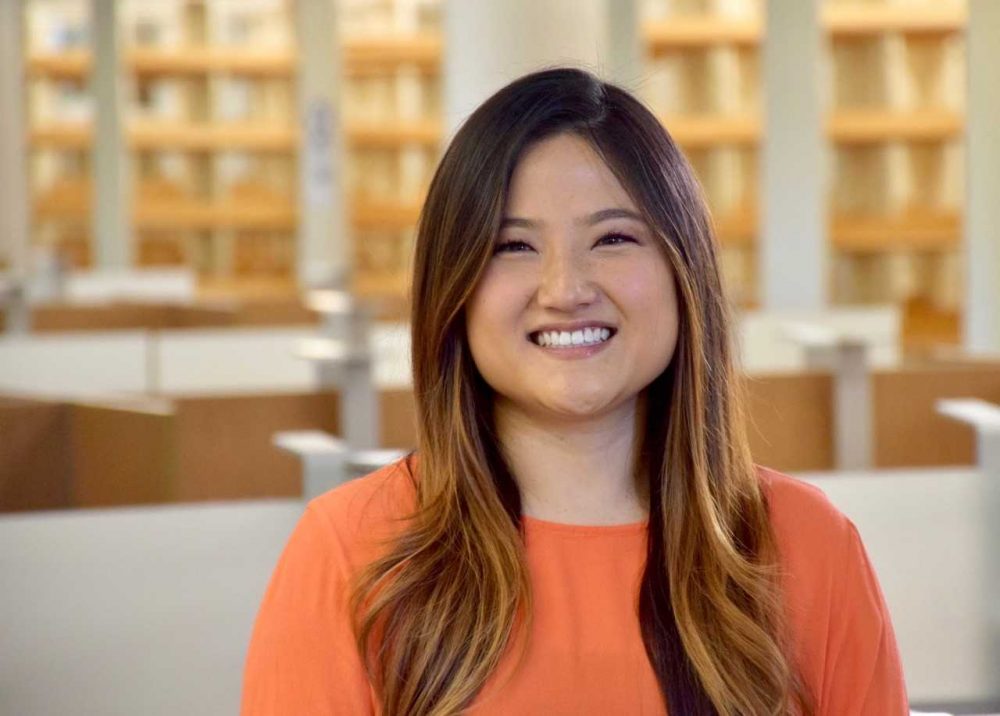Three outstanding graduates will be honoured tonight during the University of Guelph’s Alumni Association Awards of Excellence gala. The annual awards banquet is part of Alumni Weekend, which runs June 22-24. Around 1,000 alumni are expected to return to campus.
Champion of the Humble Egg
 Tim Lambert, B.Sc. 1983, Alumnus of Honour Award
Tim Lambert, B.Sc. 1983, Alumnus of Honour Award
Just out of high school, Tim Lambert came to the University of Guelph with a great Canadian dream. Quick and strong on a pair of skates and tough in the corners, he wanted to be a hockey player.
Schools across the country courted him, but he chose U of G because it was exceptional in his other passion for agricultural science. It was that latter interest that took him places and helped him change the world for the better.
Lambert will receive this year’s Alumnus of Honour Award among U of G’s Alumni Awards of Excellence.
Now chief executive officer of Egg Farmers of Canada (EFC) in Ottawa, he received his undergraduate degree in 1983 in animal and poultry science. He cherishes the time he spent at U of G, remembering vividly his runs through the Arboretum and good times with a group of buddies who became lifer friends.
“I was interested in science and I always thought that agriculture was the perfect application of science,” he says. “I think that providing food to people is one of the most honourable professions that one could be in, so I have always been proud to be a part of that.”
He never got to play hockey for the Gryphons, a disappointment that proved to be an opportunity in disguise.
“One of the reasons I came to Guelph was for the science program and to be involved in agriculture, but I was also approached to play hockey at Guelph. I came and made the team, but then I got injured. I had knee surgery the next summer.”
The dramatic turn of events forced him to redirect the energy he dedicated to hockey into his academic work and career pursuits.
“I went from thinking about getting my degree, having fun and playing a varsity sport, to needing to take a really serious look at taking the competitive drive and intensity that I always had for sport and applying that to my academic pursuits and then to my career.”
He adds: “When you go through something that’s a negative, you realize how you can turn that into a positive. It happened after my first year and it was just kind of that life-changing, gear-changing moment where you go, ‘I’ve just got to grow up a little and look at things from a different perspective and through a different lens.’”
After graduating, Tim worked for the Ontario Ministry of Agriculture, Food and Rural Affairs, managing genetic improvement programs in the sheep and pork industries. In the early ’90s, he joined the private sector in a similar field. He has led EFC since 2003, an opportunity that he says has allowed him to make an extraordinary humanitarian impact.
Of all the many things he has done to improve the egg industry and the world, his proudest accomplishment was to coordinate, through EFC, the building of an egg operation on the Project Canaan orphanage in Swaziland, Africa. In that country, 250,000 children have been orphaned by the HIV-AIDS pandemic.
The orphanage’s hen barns supply about 4,500 hard-cooked eggs to the nearly 190 orphans at Project Canaan and to more than 30 programs in the country — every day of the year. The project has fed more than 3.3 million eggs to orphaned children in Swaziland so far. Canadian egg farmers and businesses support the operation financially.
“Not only is malnutrition a big problem, but protein deficiency is just a huge obstacle for them,” he says. “The sad truth is, if a child doesn’t get adequate protein at an early age, they will never develop to reach their full potential. This is something that is truly making a difference.”
Businesses and organizations, says Lambert, have a broader responsibility to society and to our world.
“If you can help others, you have an obligation to do it. I looked at our product – the egg – and at our people – the farmers – — and said, ‘We could be involved in food banks, we can be involved in breakfast clubs, we can be involved in projects like our egg farm in Swaziland.’”
With his guidance, Egg Farmers of Canada helped found the International Egg Foundation and became involved in other projects in Uganda, Swaziland and Mozambique. In drought-prone Swaziland, a 10-kilometre pipeline is being built to bring water from the mountains down to Project Canaan’s 2,500-acre farm.
Wherever he travels around the world, Lambert hears good things about U of G. Anyone who works in agriculture has heard of the University and has positive things to say about the institution, he says. “There are Guelph grads everywhere in the ag industry. The University of Guelph turned out to be a fantastic place and the right place for me. I’ve always been proud to say I am a U of G alumnus. It’s just such a well-respected, well-known educational institution.”
A Voluntary Connection

Robin-Lee Norris, BA 1980, Alumni Volunteer Award
The secret is out. Robin-Lee Norris, respected former Guelph lawyer and volunteer extraordinaire, furtively painted Old Jeremiah, the University of Guelph’s iconic cannon, one night in the late 1970s. She had a little help from her friends.
“I will not forget that night,” says Norris, now the owner of a dispute resolution and business succession planning business.
“I’m admitting to it now because I believe the statute of limitations is over,” she adds with a laugh.
At that time, Norris was speeding through an undergraduate degree in sociology which she completed in two years – six straight semesters without a break. A night out at the pub and painting the cannon provided a much-needed break from her hectic pace of study.
But despite that pace, Norris always had time for volunteering. As a campus tour guide, she had the privilege of accompanying special visitors to the University. She once led eight representatives from the Nigerian government, all in full traditional robes, on a tour of the Elora Research Station. Transportation was by limousines, not altogether suited to the country roads and muddy entrances around the station. The scene, she recalls, was unbelievable. “That was a fascinating day,” she says.
Norris will receive the Alumni Volunteer Award in this year’s Alumni Awards of Excellence program, an honour bestowed on her for incomparable dedication to volunteer work tied to the University and the city of Guelph. Since childhood, she has been inhabited by the spirit of volunteerism; she has maintained an unbroken association with U of G as a volunteer.
“Volunteering is absolutely a core pillar in my life.” She embraced the advice of her grandfather, who said we all have an obligation to leave the world a little better than we found it.
It began in elementary school, when she participated in a campaign to provide stuffed animals to children spending Christmas in the hospital. It felt so good to do good for others that she just kept doing it.
When she returned to Guelph after Osgoode Hall Law School at York University, she found that U of G had remained as important as ever to her. “It was the ideal spot to spend some of my volunteering energy – my time, my talent, my treasure.”
Soon after returning to the city to start her law practice, Norris began serving on the first of a long string of U of G committees, campaigns and boards, including the Board of Governors and Board of Trustees. She sat on the committee that worked to transform the campus sheep barn into Alumni Affairs and Development headquarters, and she oversaw fundraising for that project.
“All the things I was involved in taught me so much and introduced me to so many amazing people. I have sat and worked with and learned from and listened to just extraordinary people over my years at the University.”
Norris loved the Arboretum as a student, and the green space has held a special place in her heart throughout her life.
“The one place where I truly feel I made a difference was the work I’ve done with the Arboretum,” she says. “For me, it became that centre of health, a place for people to stop and catch their breath in a world where we don’t have huge opportunities to do that.”
The Arboretum, she added, provides the University and the whole of Ontario with a unique learning and research opportunity, its diverse population of trees offering insights into best growing practices, disease and pest control, and protection of tree species at risk and forest ecosystems.
She counts fundraising for the Arboretum and being involved in drafting its new master plan among the highlights of her volunteer work at the University.
“The University of Guelph had a huge impact on my career and life choices,” she says. “What I learned here wasn’t just what I learned in class. It was a lot about the importance of getting along with people, the importance of being able to communicate with people in all different sorts of programs and from all parts of world.”
What she learned in classrooms, on sports teams, as a tour guide and as a friend to many has served her well throughout her life.
“The things I took away with me, whether I knew it or not, came back into play in my legal practice. In the early days of my practice, I did a lot of land use planning that involved working with and understanding the farming community. All of that came from my time here at the University.”
Describing herself as a bona fide Type A overachiever, Norris advises young people not to do what she did as a student. Instead, she says, they should feel free to take a year off to discover who they are and what they want to become.
And she advises University students to volunteer from their passion and not because it fits into a career objective.
“Volunteer from the heart,” she says. “The friendships and relationship you form you will have for life. And you will make a difference.”
The University awarded Norris one of its highest honours in 2009, the Honorary Fellowship, for her significant contributions to the life and development of U of G. Beyond campus, she has also volunteered for numerous organizations.
The Philosophy of Helping Others

Esther Rhee, BA 2005, Young Alumni Award
What can you do with a philosophy degree? Well, you can use it to make a big shift in the way you think, and change the course of your life, says Esther Rhee.
The national program director of Autism Speaks Canada is the 2018 Young Alumni Award recipient for U of G’s Alumni Awards of Excellence. She graduated with a bachelor of arts degree in 2005.
The philosophy she studied at the University of Guelph changed her perspective, changed her mind and changed her life.
“I had taken a bunch of philosophy classes and loved them,” she says. “I didn’t actually know where it was going to lead me, but I really wanted to do what I enjoyed. Something inside of me said this was an opportunity for me to grow.”
In her final year, she changed her major, diving headlong into philosophy despite the protests of many who warned she was making a bad decision, one that could bar the way to a rewarding career.
But philosophy helped her to reflect deeply, not so much on what she wanted to do with her life but on how she wanted to be in life.
“That was the big shift that happened for me here at Guelph,” says Rhee. “I’ve carried that with me all the way through, and that’s how I found my career.”
Esther is recognized nationally for her leadership in promoting mental health and raising awareness of autism. She pioneered a community collaborative model that changed the way families impacted by autism are supported in Canada.
After U of G, Rhee spent lots of time philosophically considering what would make her the best person she could be and where she could do the most good.
“I started networking, and I realized that I wanted to go into the helping field,” she says. She followed the advice of an early mentor, who told her to focus on building great relationships, because from them would come great things. She began volunteering in childhood trauma exposure around the same time.
“I loved what I did, but it was very heavy. My worldview changed, and I had to take a break and remove myself from that.”
Attending to her inner “who am I” voice and following her desire to help others led her to do a master of social work degree at Wilfrid Laurier University.
Just as she was completing that degree, she received an offer to work for a new organization dedicated to improving understanding of autism. Philosophically and emotionally, it seemed like the right thing to do. She accepted, after some trepidation.
“I actually said on the phone, ‘I think you have the wrong person. I don’t know a lot about autism at all.’ But it was one of those situations where it really seemed like the universe was truly giving me an opportunity to do something different. And I thought, why not?”
She conjured up all she had learned as a philosophy major at U of G, switched her mindset and started a not-for-profit organization, Autism Services Waterloo Region, focusing on helping people with autism and their families. After three years, she moved to Autism Speaks Canada based in Toronto, where she has helped build hundreds of programs across the country.
Rhee had many great experiences at U of G, but one of her most noteworthy, she says, was a close bond she had with a laboratory rat.
“We were in the lab all the time teaching them tricks and conditioning them, and that was truly one of my favourite memories. I ended up adopting that rat afterwards. People often knew me as the girl who had the pet rat at Guelph.”
She calls her time at U of G “transformative,” a time of growing confidence and independence.
“When I look back over my whole career trajectory, I had no idea where life was going to take me. And that was a great thing, to be open and to just trust – to trust who I wanted to be and that it would bring wonderful things.”
She calls her work a dream job that affords her the privilege of addressing Canadian members of Parliament to spread awareness about autism. She has many public speaking engagements throughout the year and is involved in numerous exciting projects, all aimed at helping people.
“I’m really proud that I stuck to my values and I never forgot why I got into all of this, why I wanted to get into social work, and it was just to give, to serve and support other people.”
Rhee returns often to U of G to see her favourite professors and to speak with students about life after university. What does she tell them?
“I say, ‘Take your blinders off.’ Some of the opportunities that are going to present themselves after graduation don’t even exist right now. There’s no way we can predict what that path will look like, so truly focus on who you want to be, what your values are and what direction you want to go in.”